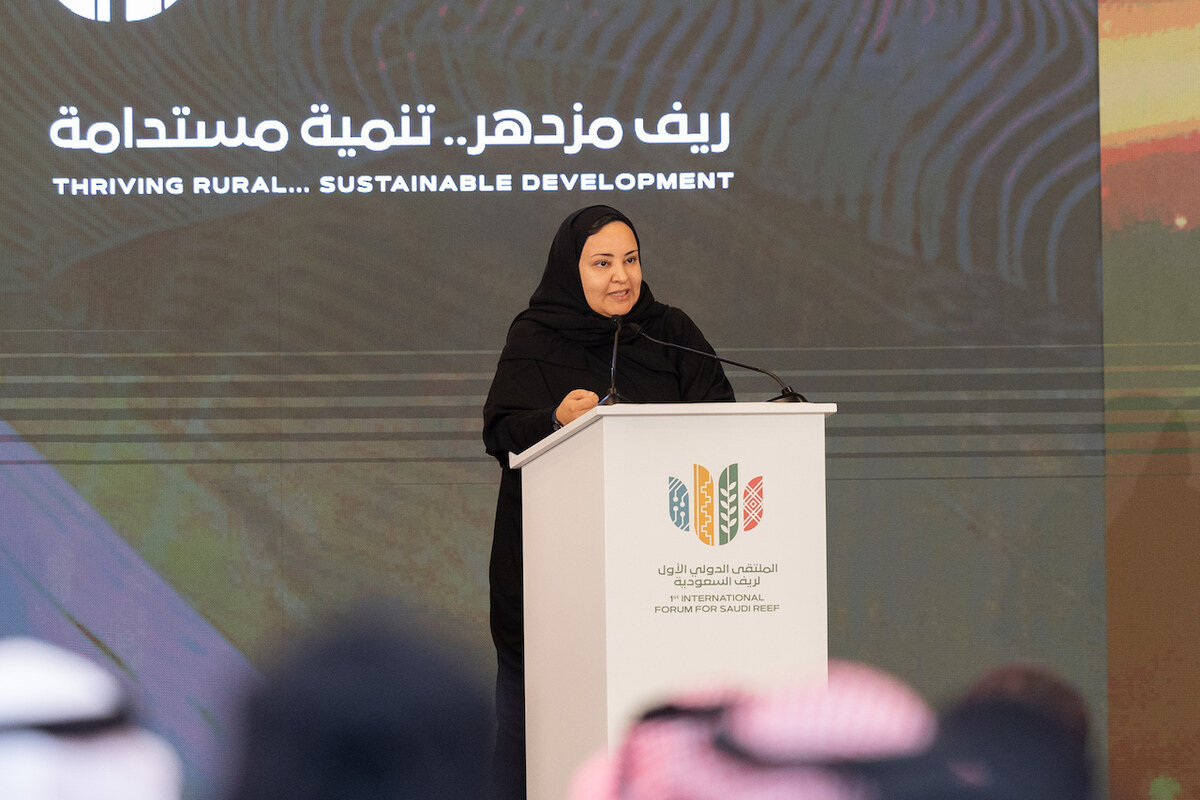Al-Ahsa: The first International Forum for Saudi Reef, hosted in Al-Ahsa, was awarded a Guinness World Records certificate for the highest number of attendees in a single day at an agricultural forum globally.
Maha Al-Dhahi, head of the forum’s executive committee, and a keynote speaker at the event, told Arab News: “The Reef Program is a national initiative designed to support small farmers by providing funding, training and capacity-building programs that help them increase their income and improve productivity.
“The program (has run) for seven years with a budget of SR8.5 billion ($2.2 billion), promoting reliance on local production, thereby enhancing the national economy and fostering agricultural sustainability in the Kingdom.”
The forum involved more than 71 entities and presented various inspiring stories. It highlighted environmental awareness, food security and the role of entrepreneurship in fostering economic and social sustainability.

A session during the first International Forum for Saudi Reef
“The forum serves as an initial step toward enhancing agricultural sustainability by adopting effective practices that support small-scale producers and provide integrated services across all production phases,” Al-Dhahi said. “It contributes to realizing Saudi Vision 2030 by boosting local production, achieving food security and promoting environmental sustainability.”
An opening panel session on “The Rural Community and Its Role in Achieving the Sustainable Development Goals and Saudi Vision 2030” was led by Al-Ahsa Gov. Prince Saud bin Talal bin Badr, and Minister of Environment, Water and Agriculture Abdulrahman Al-Fadhli.
The event also witnessed the signing of six MoUs between Saudi Reef and several governmental and private entities, including agreements with the Saudi Food and Drug Authority, the Culinary Arts Authority, the King Khalid Foundation, and the Technical and Vocational Training Corporation.
In his opening remarks, Prince Saud highlighted the importance of rural development, highlighting that 60 percent of Saudi Arabia’s population is aged under 30 and that women comprise 43 percent of the agricultural workforce.
The three-day forum featured speeches from prominent figures such as Princess Mashael bint Saud Al-Shalan and officials from the Ministry of Environment, Water and Agriculture.
Discussions centered on empowering rural communities, building human capacities and the role of rural families in agricultural growth. The forum also showcased initiatives like the Saudi Reef Academy.

Princess Mashael bint Saud Al-Shalan speaks at the first International Forum for Saudi Reef
Workshops and sessions covered key themes, including rural innovation, sustainable agriculture, food security, tourism and culture. Attendees took part in practical activities, such as visits to local farms and engaged in cultural and professional discussions.
The forum also highlighted sustainable investments, rural entrepreneurship, and the integration of rural communities into tourism and culture to support economic diversification and achieve Saudi Vision 2030.
A three-day exhibition complemented the forum, featuring agricultural innovations, entrepreneurial success stories and participation from international organizations such as the UN Food and Agriculture Organization.

Maha Aldhahi, head of the forum’s executive committee
Sponsored by Dan Co., a Public Investment Fund entity specializing in rural and agritourism, the forum showcased Saudi Arabia’s agricultural diversity and promoted sustainable tourism, aiming to balance urban and rural progress while aligning with the UN Sustainable Development Goals.
Local farmers and craftsmen also showcased their goods in a space adjacent to the stage area.
Mohammed Al-Ghazal, CEO of Noor Energies Group, told Arab News: “Personally, I have benefited immensely by listening to the perspectives of global leaders and innovators at the First International Forum for Saudi Reef,” he said. “From interactive events to cultural experiences, such as site visits, there’s something for everyone to enjoy and stay green!”
















